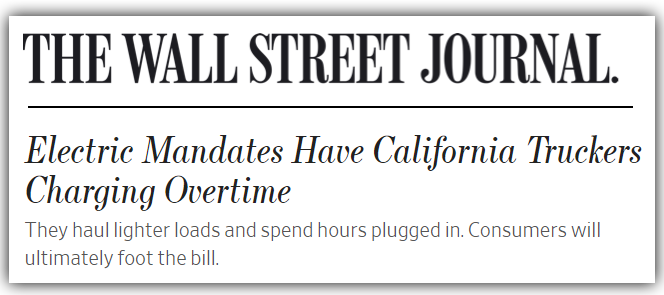California rang in the new year by delaying enforcement of its "Advanced Clean Fleets" Regulation, which requires trucking companies operating in the state to purchase an increasing percentage of electric trucks in the coming years. While enforcement was slated to begin this week, officials at the California Air Resources Board agreed to pause the registration and compliance requirements until the U.S. Environmental Protection Agency grants the regulation a green light to proceed.
It's an inauspicious start for a program that's on a clear collision course with reality.
Reporting from the Wall Street Journal validates what ATA has been telling lawmakers for many months: the charging infrastructure, power generation and transmission, product performance, and operational parity required for such a policy to succeed are nowhere near ready. The WSJ report illustrates how even drayage operators—those who run short-haul routes to and from ports and other intermodal facilities—are struggling to charge their equipment and maintain deliveries on time.
A second haul started around noon—and that was it for the day. In a diesel truck, Mr. Ramos said, he could have made six hauls. But even the second one required another visit to the charging station—33 miles out of his way, and another hour and a half of charging. A diesel semi can fuel up in 15 minutes and then drive 1,000 miles—a round trip from Los Angeles to Reno, Nev.—before needing to refuel. Making the same trip, Mr. Ramos’s electric truck would have to make six recharging stops of at least 90 minutes each.
Fewer deliveries mean $400 less a month for Mr. Ramos. Although he gets paid by the hour, he receives a commission for each delivery.
These real-world challenges for drayage portend disaster for over-the-road and long-haul operations. These concerns aren’t theoretical – they are backed by hard data: American Transportation Research Institute just released new research revealing how unprepared California is for the aggressive timelines and targets it has mandated on trucking companies small and large:
As WSJ corrected noted, consumers will ultimately foot the bill.
